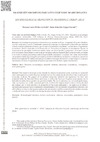Please use this identifier to cite or link to this item:
https://accedacris.ulpgc.es/jspui/handle/10553/114242
| Title: | Transición socioecológica en conjuntos tradicionales | Other Titles: | Socioecological transition in traditional urban areas | Authors: | Febles Arévalo, Tamara Lucía López García, Juan Sebastián |
UNESCO Clasification: | 241005 Ecología humana 6311 Sociología de los asentamientos humanos |
Keywords: | Transición socioecológica Desarrollo resiliente Indicadores Comunidades Investigación-acción-participativa, et al |
Issue Date: | 2021 | Publisher: | Cabildo Insular de Gran Canaria | Conference: | XXIV Coloquio de Historia Canario-Americana | Abstract: | La investigación propuesta se desarrolla en un contexto en el que la magnitud del cambio climático, las crisis económicas, sociales y ambientales precisan de estrategias de regeneración y desarrollo que reduzcan la huella ecológica planetaria al tiempo que se mejora la resiliencia comunitaria. Las iniciativas y experiencias comunitarias previas enmarcadas en el Movimiento de Transición y el proyecto de investigación Barrios en Transición tienen por objeto afrontar esta realidad desde una actitud positiva y propositiva. Se asume la ciudad como un sistema socioecológico, conformado por múltiples unidades socioecológicas de menor escala, y el barrio como escala estratégica para trabajar desde la imprescindible participación ciudadana. Este trabajo trata de definir una propuesta metodológica integral y participativa, dotada de indicadores cuantitativos y cualitativos, que facilite abordar la complejidad de análisis necesaria para establecer estrategias de transición socioecológica en conjuntos tradicionales, así como el seguimiento del proceso por parte de los distintos agentes involucrados. This research is developed on the principle that climate change and economic, social and environmental crises need regeneration and development strategies that can both reduce the global carbon footprint and improve community resilience. The purpose of the previous community initiatives and experiences that have been conducted within the Transition Towns movement, as well as the Transition Neighbourhoods project, was to deal with this reality from a positive and proactive attitude. The city is understood as a socioecological system, made by numerous and smaller socioecological units, in which the neighbourhood is seen as having the ideal and strategic size to work with from the perspective of the citizen participation. This paper aims to define a methodological proposal, both comprehensive and participative, with quantitative and qualitative indicators, that will facilitate carrying out the complex analyses that are needed to establish socioecological transition strategies in traditional urban areas, as well as monitoring the process by the different agents involved. |
URI: | https://accedacris.ulpgc.es/handle/10553/114242 | ISSN: | 2386-6837 | Source: | XXIV Coloquio de Historia Canario-Americana [ISSN 2386-6837] |
| Appears in Collections: | Póster de congreso |
Page view(s)
91
checked on Jan 11, 2026
Download(s)
21
checked on Jan 11, 2026
Google ScholarTM
Check
Share
Export metadata
Items in accedaCRIS are protected by copyright, with all rights reserved, unless otherwise indicated.
